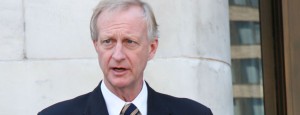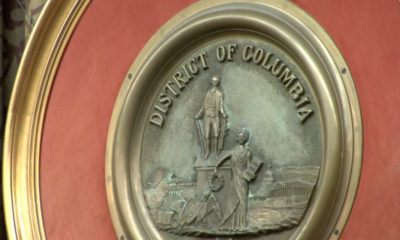Local
Evans, Brown enter race for Council chair
Anti-gay candidate runs in at-large contest

D.C. City Council member Jack Evans, seen here at an event celebrating the passage of same-sex marriage, is running for the Council chairman’s seat. He will run against Council member Kwame Brown. (DC Agenda photo by Michael Key)
D.C. City Council members Jack Evans (D-Ward 2) and Kwame Brown (D-At Large) have announced they are candidates for the Council chairman’s seat, creating another citywide contest where LGBT voters must choose between friends.
Evans and Brown entered the Council chairman race after the current chairman, Democrat Vincent Gray, declared his candidacy for mayor, challenging Mayor Adrian Fenty’s bid for a second term in September’s Democratic primary.
Much as they did with the mayor’s race, most gay Democratic activists have said they are not ready to take sides in the Council chair contest, expressing an interest in seeing the LGBT-friendly candidates for mayor and Council chair speak out on both gay and non-gay issues.
However, Evans’ strong support for LGBT rights extends over 20 years in his role as the Council’s most senior member. His longer record on LGBT issues is expected to give him an edge over Brown for the gay vote — at least in some parts of the city.
“We have a process for endorsing candidates and we’re going to follow that process,” said Jeffrey Richardson, president of the Gertrude Stein Democratic Club, the city’s largest LGBT political group.
In a timetable approved earlier this year, the club will hold an endorsement meeting June 14 for Democratic mayoral candidates, who will be invited to speak and answer questions from club members. The club is scheduled to vote on an endorsement after the candidates speak.
Stein Club officials scheduled a similar endorsement meeting July 12 for Democratic candidates running for the Council chairman seat as well as one of two at-large Council seats up for grabs, in which gay Democratic activist Clark Ray is challenging pro-gay Democratic incumbent Phil Mendelson.
City Council insiders have said Mendelson is considering running for the Council chairman seat now that Gray is giving it up to run for mayor. But unlike Evans and Brown, Mendelson remained silent this week on his intentions, leading some City Hall observers to speculate that he has decided to run once again for his at-large post.
A decision by Mendelson to give up his at-large seat to run for Council chairman was expected to greatly boost Ray’s chance of becoming the Council’s third openly gay member. Gay Council incumbents David Catania (I-At Large) and Jim Graham (D-Ward 1) are also up for re-election this year.
Meanwhile, in a little noticed development, gay rights opponent Richard Urban, who has testified repeatedly in favor of a ballot measure to kill the city’s same-sex marriage law, filed papers to run as an independent candidate for an at-large Council seat.
Under the city’s unusual election rule governing the Council’s at-large seats, Urban would be competing for the seat held by Catania, the author and lead advocate for the gay marriage law.
The city’s election law, which Congress wrote at the time it approved the city’s home rule charter in the early 1970s, requires at least one of the two at-large seats up for election this year to go to a non-majority party candidate. Since Democrats make up the majority party, only one of the two seats can go to a Democrat and both, theoretically, can go to a non-Democrat.
So far, Mendelson and Ray are the only Democrats competing for the Democratic nomination for the majority party seat. The Washington City Paper reported this week that Kelvin Robinson, who served as chief of staff to former Mayor Anthony Williams, is strongly considering entering the Democratic primary contest against Mendelson and Ray. Robinson is believed to share Williams’ strong views in support of LGBT rights, including same-sex marriage.
Most political observers consider Mendelson the strong favorite to win the nomination and the general election should he decide to stay in the race, with the gay vote expected to split between Ray and Mendelson. Mendelson, a longtime supporter of LGBT rights, is credited with shepherding Catania’s same-sex marriage bill through the Council in his role as chair of the committee with jurisdiction over the bill.
Urban’s candidacy, while considered a long shot, could potentially galvanize voters who oppose gay marriage, possibly turning Catania’s re-election bid into a surrogate referendum on marriage. Catania, however, could benefit from yet another independent candidate who also opposes same-sex marriage, Rev. Anthony Motley, who has been campaigning for the so-called non-Democratic at-large seat since June.
Unlike Urban, Motley has expressed support for LGBT rights in all areas other than marriage, saying he supports civil unions instead of same-sex marriage. Urban’s candidacy could potentially split the anti-same-sex marriage vote, strengthening Catania’s chances of winning the second, non-Democratic at-large seat.
In addition to opposing same-sex marriage and calling for a voter initiative to overturn the same-sex marriage law, Urban has campaigned against including gay-related content in the D.C. public school system’s sex education curriculum. He has also emerged as one of the city’s strongest advocates of abstinence until marriage as the main method of preventing the spread of HIV/AIDS. He’s expressed strong opposition to the city’s current policy of distributing free condoms to all groups considered at high risk for HIV, including high school students.
On his campaign web site, Urban lists at the top of his platform a call for “marriage defined as the union of one man and one woman only.” In a position paper on the city’s public schools curriculum, he calls for eliminating all references to sexual orientation and gender identity from school sex education courses — components of the curriculum that LGBT activists lobbied to put in place.
Urban, who is white, is expected to reach out to socially conservative black voters in wards 7 and 8, as well as in other parts of the city, who have expressed strong opposition to gay marriage.
Under the city’s election law, the two at-large seats are awarded to the two candidates — regardless of their party affiliation — who receive the highest vote counts in the general election in November.
Catania enjoys widespread support among voters across the city on a wide range of issues, and he’s considered the strong favorite to retain the non-Democratic seat. But Urban’s status as the first full-fledged anti-gay candidate to run for a City Council seat in many years is expected to put to the test the strength of a vocal group of socially conservative ministers who have vowed to push for the defeat of Council members who voted for the gay marriage bill.
Numbers filed with the city’s Office of Campaign Finance, however, show Urban had raised just $570 for his campaign as of the reporting period ending March 10, an amount that would lead most political observers to conclude he has yet to become a serious candidate.
Catania, by comparison, raised slightly more than $134,000 as of the same reporting period, according to records.
Each of the remaining Council members up for re-election this year have strong records of support for LGBT rights and each voted for the same-sex marriage bill. They include Graham (D-Ward 1), Mary Cheh (D-Ward 3), Harry Thomas (D-Ward 5) and Tommy Wells (D-Ward 6).
So far, each of the four is considered favorites to win re-election, although Graham and Thomas face candidates who could wage a competitive race. Gay marriage opponents in Ward 5 vowed to target Thomas for defeat. The views on same-sex marriage among three of the four candidates running against Thomas could not be immediately determined.
One of Thomas’s challengers, gay Republican Timothy Day, said he supports same-sex marriage and would run against Thomas on non-gay issues.
Among the few gay Democratic activists who have taken sides in the mayor’s race, most emerged as supporters of Gray, including two of the 12 openly gay members of the D.C. Democratic State Committee, the governing body of the city’s Democratic Party. Five of the gays on the committee said they would remain neutral in the race for the time being. Among the gay State Committee members remaining neutral is Stein Club Vice President Sheila Alexander-Reid, a prominent Fenty backer in 2006. Gay State Committee member Stephen Gorman did not respond to a call seeking his position on the mayor’s race.
But three prominent gay civic leaders this week said they enthusiastically support Fenty’s re-election, based on his approach to gay and non-gay issues. The three are Alex Padro, an elected Advisory Neighborhood Commissioner from the Shaw area; Scott Rogerson, president of the French Street Neighborhood Association in the Logan Circle area; and Martin Moulton, president of the Convention Center Community Association, which represents the neighborhood surrounding the D.C. Convention Center.
All three said Fenty’s administration took important steps to improve their respective neighborhoods. When asked whether they agreed with Fenty critics, including some in the gay community, that have described the mayor as aloof and not directly engaging community groups and rarely attending gay events, the three did not dispute that criticism but noted that the mayor’s personality didn’t bother them.
“I don’t have to have my mayor be touchy feely to make me happy,” Rogerson said. “I want him to be an effective mayor, keep the budget in line, and get projects done. I don’t need the warm hug, I need results, and he has produced results.”
Gay backers of Vincent Gray, including gay Democratic activist Lane Hudson, have said Fenty’s aloofness and failure to speak out publicly on issues like anti-gay hate crimes have prevented his administration from having a greater impact on such issues.
District of Columbia
D.C. Black Pride theme, performers announced at ‘Speakeasy’
Durand Bernarr to headline 2026 programming

The Center for Black Equity held its 2026 DC Black Pride Theme Reveal event at Union Stage on Monday. The evening, a “Speakeasy Happy Hour,” was hosted by Anthony Oakes and featured performances by Lolita Leopard and Keith Angelo. The Center for Black Equity organizes DC Black Pride.
Kenya Hutton, Center for Black Equity president and CEO, spoke following the performances by Leopard and Angelo. Hutton announced this year’s theme for DC Black Pride: “New Black Renaissance.”
Performers for 2026 DC Black Pride were announced to be Bang Garcon, Be Steadwell, Jay Columbus, Bennu Byrd, Rue Pratt and Akeem Woods.
Singer-songwriter Durand Bernarr was announced as the headliner for the 2026 festivities. Bernerr gave brief remarks through a video played on the screen at the stage.
DC Black Pride is scheduled for May 22-25. For more information on DC Black Pride, visit dcblackpride.org.
Virginia
Arlington LGBTQ bar Freddie’s celebrates 25th anniversary
Owner asks public to support D.C.-area gay bars

An overflowing crowd turned out Sunday night, March 1, for the 25th anniversary celebration of Freddie’s Beach Bar, the LGBTQ bar and restaurant located in the Crystal City section of Arlington, Va.
The celebration began as longtime patrons sitting at tables and at the bar ordered drinks, snacks, and full meals as several of Freddie’s well-known drag queens performed on a decorated stage.
Roland Watkins, an official with Equality NoVa, an LGBTQ advocacy organization based in the Northern Virginia areas of Arlington, Alexandria, and Fairfax County, next told the gathering about the history of Freddie’s Beach Bar and the role he said that owner Freddie Lutz has played in broadening the bar’s role into a community gathering place.
“Twenty-five years ago, opening a gay bar in Arlington was not a given,” Watkins told the crowd from the stage. “It took courage, convincing, and a deep belief that our community belongs openly, visibly, and proudly,” he said. “And that belief came from Freddie.”
Watkins and others familiar with Freddie’s noted that under Lutz’s leadership and support from his staff, Freddie’s provided support and a gathering place for LGBTQ organizations and a place where Virginia elected officials, and candidates running for public office, came to express their support for the LGBTQ community.
“Over the past 25 years, Freddie’s has become more than a bar,” Watkins said. “It has become a community maker.”
Lutz, who spoke next, said he was moved by the outpouring of support from long-time customers. “Thank you all so much for coming tonight and thank you all so much for your support over the past 25 years,” he said. “I can’t tell you how much that means to me and how much it’s kept me going.”
But Lutz then said Freddie’s, like many other D.C. area gay bars, continues to face economic hard times that he said began during the COVID pandemic. He noted that fewer customers are coming to Freddie’s in recent years, with a significant drop in patronage for his once lucrative weekend buffet brunches.
“So, I don’t want to be the daddy downer on my 25-year anniversary,” he said. “But this was actually the worst year we’ve ever had,” he added. “And I guess what I’m asking is please help us out. Not just me, but all the gay bars in the area.” He added, “I’m reaching out and I’m appealing to you not to forget the gay bars.”
Lutz received loud, prolonged applause, with many customers hugging him as he walked off the stage.

In an official statement released at the reveal event Capital Pride Alliance described its just announced 2026 Pride theme of “Exist, Resist, Have the Audacity” as a “bold declaration affirming the presence, resilience, and courage of LGBTQ+ people around the world.”
The statement adds, “Grounded in the undeniable truth that our existence is not up for debate, this year’s theme calls on the community to live loudly and proudly, stand firm against injustice and erasure, and embody the collective strength that has always defined the LGBTQ+ community.”
In a reference to the impact of the hostile political climate, the statement says, “In a time when LGBTQ+ rights and history continue to face challenges, especially in our Nation’s Capital, where policy and public discourse shape the future of our country, together, we must ensure that our voices are visible, heard, and unapologetically centered.”
The statement also quotes Capital Pride Alliance CEO and President Ryan Bos’s message at the Reveal event: “This year’s theme is both a declaration and a demand,” Bos said. “Exist, Resist, Have Audacity! reflects the resilience of our community and our responsibility to protect the progress we’ve made. As we look toward our nation’s 250th anniversary, we affirm that LGBTQ+ people have always been and always will be part of the United States’s history, and we will continue shaping its future with strength and resolve,” he concluded.
-

 India5 days ago
India5 days agoActivists push for better counting of transgender Indians in 2026 Census
-

 Advice5 days ago
Advice5 days agoDry January has isolated me from my friends
-

 National5 days ago
National5 days agoAfter layoffs at Advocate, parent company acquires ‘Them’ from Conde Nast
-

 District of Columbia5 days ago
District of Columbia5 days agoCapital Pride reveals 2026 theme




















